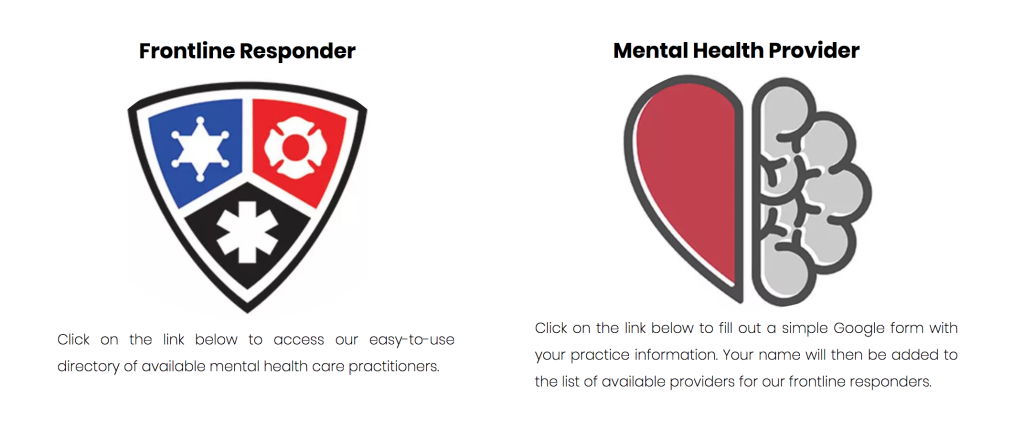COVID-19 has brought changes—and degrees of stress—to us all, as we endeavor to meet obligations, adjust to new pressures in our home and personal lives, and be vigilant in protecting our health and that of our friends and loved ones. These tensions can be particularly acute for people like healthcare workers, who not only are seeing the impact the virus can have every time they go to work, but also are putting themselves at a higher risk for infection.
In order to help healthcare workers and others across Michigan who are still reporting to work in public spaces during the pandemic, Sara Stein—a sixth-year Ph.D. candidate in social work and clinical psychology—has helped to create mifrontlinesupport.com. This online directory provides access to available mental health resources for Michiganders working on the COVID-19 frontline.
“What is being asked of the frontline workers is really incredibly overwhelming,” says Stein. “We want to help reduce barriers for them to get mental health services with an up-to-date list of available providers that we are monitoring every single day.”
Spreading the Word
The project originated when Stein’s friend and colleague Erin Barbossa began circulating a simple Word doc of therapists who were willing to see doctors and nurses on off times. With the help of Stein and collaborators Felicia Brabec, Sarah Jurkovic, and Joy Ensor, that evolved into the idea of a resource for all those on the frontline, whether they’re working behind a cash register, a steering wheel, or a pharmacy window. The site then launched April 6 with two fundamental objectives: to list therapists able to take on new patients, and to provide a way for therapists to list their availability. To date, more than 300 therapists have signed on, some of whom are able to offer services voluntarily or on a sliding scale. Of course, Stein says, cost isn’t the only obstacle for workers seeking help with their mental health.
“I’ve seen a few different people this week, and they all are saying, ‘I have never had an issue before. I’ve never had an issue with anxiety or not being able to sleep.’ And this is the first time that something like this is coming up. It tends to be a huge barrier when you want mental health support. People have questions like, ‘Does that mean I want a psychiatrist? Or a social worker? Who takes my insurance?’ So that can be a really taxing process when someone’s in the middle of a crisis. We were thinking it’s too much to ask people to do that leg work right now.
“Our intent is not to act as the gatekeeper of services,” Stein continues. “Our intent is only to make the services more accessible.”

This screen capture from the Michigan Frontline Support site shows the interface for responders and providers.
A Lot on the Line
Stein says that she and her collaborators recognize that people who are keeping essential businesses functioning might have different experiences than somebody who’s working in a hospital right now, but that doesn’t mean that work is less taxing for them. Anyone who’s donned a mask and gloves to make a 15-minute dash into a store for supplies, for example, can appreciate the tension in a space where someone else is working an eight-hour shift. Additional factors can come into play for those who need to work but who cannot do so from home.
“This doesn’t apply to everyone, but people who are employed by a health system or in a hospital setting by and large may have more access to things like medical benefits or may be more likely to be salaried,” Stein says. “A delivery or Uber driver would not necessarily have those same levels of social protections in place. Maybe their moment-to-moment stress is less, but I think their vulnerability is a lot higher.
“My sense is that there is a huge socioeconomic divide there. I’ve heard time and time again from people who were like, ‘I can’t get sick because I don’t have insurance and I will go into financial ruin if I need to go to the hospital because of this.’ I think some of the worries and the demands on the service providers really place them at a high level of risk for developing post-traumatic stress, given the situation that they’re in and potentially without a lot of access to mental healthcare. And so that’s where the initiative comes in with mental health clinicians signing on who are willing to provide pro bono services or services on a scale.”
Looking Ahead
Stein’s doctoral research is centered on understanding risk for intimate partner violence and lack of relational well-being. In this work, she looks at individual and social predictors of experiencing chronic intimate partner violence victimization in order to develop more effective and sustainable prevention and treatment interventions. Her clinical work focuses on complex trauma treatment. As she moves forward in her career, one thing she hopes to carry forward from Michigan Frontline Support is broadening access to mental healthcare.
“It is incredibly challenging for an individual to find a therapist,” she says. “Many treatment centers or clinics have three- to six-month wait lists, and few community clinics will accept Medicare or Medicaid. So there are just huge issues with access to care and to information. We need a more consolidated way for people to make informed decisions about who to contact and to reduce the amount of effort and time that it takes for somebody to do so, so that they don’t give up before they find care they need.”
Rackham Students: Are you working on COVID-19 issues? Finding new ways to move your scholarship forward at this time? Discovering effective practices for remote teaching? We’d love to highlight your story. Just email us at Rackham Communications.
Interested in supporting Rackham students? Make a gift to the Rackham Graduate Student Emergency Fund.

